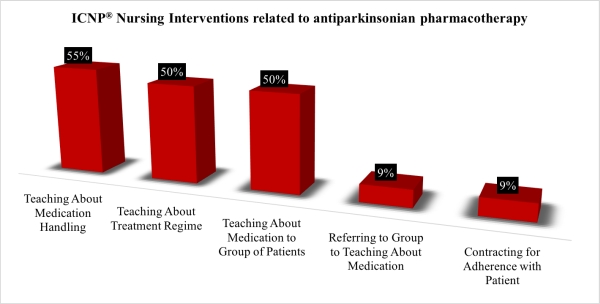Session Information
Date: Thursday, June 23, 2016
Session Title: Other
Session Time: 12:00pm-1:30pm
Location: Exhibit Hall located in Hall B, Level 2
Objective: To analyze the role of nurses in antiParkinsonian pharmacotherapy based on the International Classification for Nursing Practice (ICNP®).
Background: Although it is considered an incurable disease, the medical area has been trying, for many years, the pharmacotherapy as the main strategy for improving the quality of life of patients with Parkinson’s disease. But the non-adherence to anti-Parkinsonian therapy has been much discussed by the researchers of this theme. Thus, the assumption of this research was that the studies that focus on strategies for patient adherence to drug treatment, based on standardized language diagnostics and nursing interventions, can support the role of nurses in this caring area.
Methods: We used a descriptive approach to analyzing, from March / 2009 to May / 2014, 352 records of patients with Parkinson’s disease who were participating in a rehabilitation program. Data collection and analysis were done in four steps: 1 – identifying the demographic characteristics of the patients; 2 – identification of terms related to nursing diagnoses and nursing interventions; 3 – standardization of these terms through the cross-mapping with ICNP® Version 2013; 4- validation of nursing diagnoses and nursing interventions by experts.
Results: The results from the first step of this research show that 62% of patients were male; 60% were aged between 61 and 80 years; 72% were between 1 and 10 years of the course of disease evolution; and the majority was affected by the mixed form of Parkinson’s disease (54%).
| Variables | (n=352) | % |
| Gender (Male/Female)+ | 218/134 | 62/38 |
| Mean age (years)* | 66±11 | – |
| Mean duration of disease (years)* | 7±5 | – |
| Type of PD (M/AR/T)+ | 189/96/20 | 54/27/6 |
| Mean number of ND per patient* | 0.5±0.3 | – |
| Mean number of NI per patient* | 1.7±0.2 | – |
| Code | Axis | Nursing Diagnosis ICNP® | n=352 | % |
| 10023937 | DC | Medication Supply Deficit | 37 | 11 |
| 10022635 | DC | Impaired Ability To Manage Medication Regime | 29 | 8 |
| 10028670 | DC | Effective Response to Medication | 24 | 7 |
| 10017043 | DC | Ineffective Response To Medication | 23 | 7 |
| 10029272 | DC | Able To Manage Medication Regime | 17 | 5 |
| 10021941 | DC | Lack Of Knowledge Of Medication Regime | 17 | 5 |
| 10021682 | DC | Non Adherence To Medication Regime | 17 | 5 |

Conclusions: The results of this research identified, through the nursing diagnoses, that patients with Parkinson’s disease have problems related to anti-Parkinson therapy. It was also observed that the nursing interventions highlighted the role of specialist nurses. However, it is considered necessary to expand this knowledge by conducting clinical research focusing nursing interventions based on nursing terminologies.
To cite this abstract in AMA style:
M.H.S. Tosin, B.G.R.B. Oliveira, T.R. Garcia. Nursing diagnoses and interventions in rehabilitation related to antiParkinsonian pharmacotherapy [abstract]. Mov Disord. 2016; 31 (suppl 2). https://www.mdsabstracts.org/abstract/nursing-diagnoses-and-interventions-in-rehabilitation-related-to-antiparkinsonian-pharmacotherapy/. Accessed January 28, 2026.« Back to 2016 International Congress
MDS Abstracts - https://www.mdsabstracts.org/abstract/nursing-diagnoses-and-interventions-in-rehabilitation-related-to-antiparkinsonian-pharmacotherapy/
